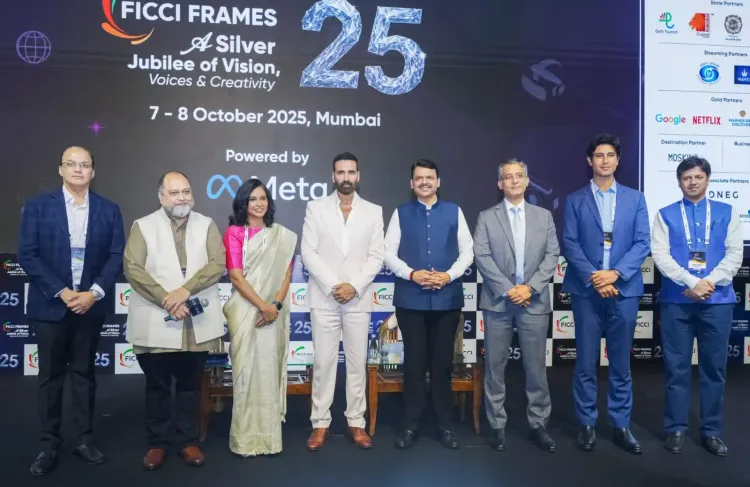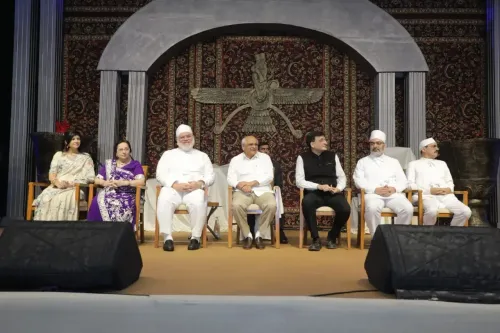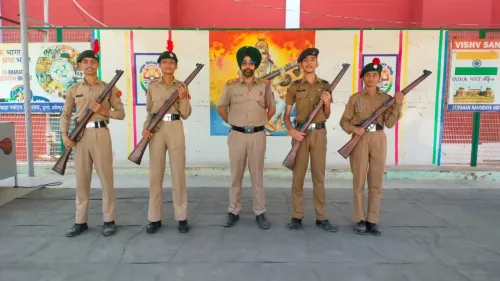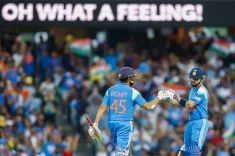Will Film City Evolve into a World-Class Film Ecosystem?

Synopsis
Key Takeaways
- Maharashtra's Film City is set for a major transformation over the next four years.
- Focus on integrating advanced technologies in film production.
- Strategies will be developed to engage younger audiences with Marathi cinema.
- The initiative aims to establish India as a global content production hub.
- The government is addressing industry challenges such as piracy and equitable revenue distribution.
Mumbai, Oct 7 (NationPress) The Chief Minister of Maharashtra, Devendra Fadnavis, announced an ambitious plan to revamp Mumbai's Film City located in Goregaon into a premier film ecosystem within a four-year period, showcasing the state's commitment to establish India as a leading global hub for content production.
This announcement was made during a panel discussion at the 25th FICCI Frames event, alongside acclaimed actor and producer Akshay Kumar.
Fadnavis noted that the project had not progressed during his previous term from 2014 to 2019, despite thorough planning efforts.
“This time, I am determined to transform Film City into a world-class film ecosystem,” Fadnavis stated, responding to Akshay Kumar's encouragement to prioritize the initiative.
The Chief Minister confirmed that the redevelopment will commence within a year.
Furthermore, Fadnavis expressed his intention to formulate strategies to engage younger audiences with Marathi cinema, acknowledging the lack of focused efforts in the past despite the regional industry’s creative prowess.
“You have inspired me with a new mantra—finding ways to connect Gen Z to Marathi films. I will take action on this,” he told Akshay Kumar.
The redevelopment aims to introduce cutting-edge studios equipped to integrate emerging technologies such as virtual production, artificial intelligence, and advanced visual effects.
Currently, the site is home to the Indian Institute of Creative Technology, which is primarily owned by industry organizations like FICCI and partially by the Maharashtra government and the Centre, according to a government statement.
This announcement comes at a pivotal moment for India's creative economy, with the media and entertainment sector having expanded tenfold in the past 25 years.
Sanjay Jaju, Secretary of the Union Ministry of Information and Broadcasting, reported that the industry has surged from Rs 25,000 crore in 2000 to about Rs 2.5 lakh crore today, as stated by the government.
Ashish Shelar, the state's Minister of Cultural Affairs, mentioned that the media and entertainment sector contributes over Rs 2 lakh crore to the regional GDP.
The state government is initiating an all-encompassing film policy and developing additional film cities across Maharashtra to meet the growing demand.
Ayushmann Khurrana, a Bollywood star and FICCI Framed Ambassador, commented on the silver jubilee edition of the event, highlighting its role in uniting creative professionals and shaping the Indian entertainment landscape over a quarter-century.
“Indian narratives and talents are gaining us global acclaim, with FICCI leading the charge towards change,” said the national film award-winning actor.
“We possess more than a billion stories to share, and today is our moment,” he added.
Secretary Jaju shared the government’s broader vision, noting that digital media is expanding at double the rate of India's GDP, with the animation, visual effects, gaming, and extended reality sectors growing at an annual rate of 30%.
Indian content is now accessible in over 200 countries, distributed via streaming services like Netflix, Amazon Prime, and JioStar.
The Secretary of the Union Ministry of Information and Broadcasting identified several pressing challenges, such as piracy, which affects national security and financial integrity, misinformation undermining public trust, and the necessity for equitable revenue sharing with content creators.
“It’s crucial that this growth is accompanied by a strong sense of responsibility,” he emphasized, reinforcing the government’s pledge to uphold ethical standards amid expansion.
Anant Goenka, Senior Vice-President of FICCI, remarked that establishing the Indian Institute of Creative Technology marks a significant advancement for the sector.
This institution, created as an industry-driven platform, aims to address essential needs such as workforce development, research, innovation, and policy alignment while assisting states in crafting policies for animation, visual effects, gaming, and extended reality.










